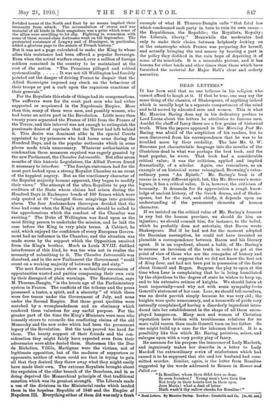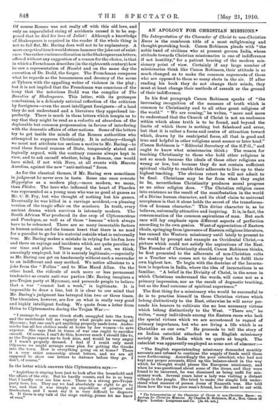DEAD LETTERS.*
IT has been said that no one believes in his religion who cannot afford to laugh at it. If that be true, one may say the
same thing of the classics, of Shakespeare, of anything indeed which is usually kept in a separate compartment of the mind and held sacred by educated men and women. This is what Mr. Maurice Baring does say in his dedicatory preface to
Lord Lucas about the letters he attributes to famous men. Amidst the chaff of fancy there are a few grains of historical truth. When the papers appeared in the Morning Post Mr.
Baring was afraid of the scepticism of his readers, but he soon discovered from his correspondence that he was to be troubled more by their credulity. The late Mr. G. W.
Steevens put characteristic language into the mouths of the illustrious dead in what was perhaps the best book, and the
least popular, he wrote. That book had a considerable critical value ; it was the criticism, applied and implied dramatically, of a scholar. Again, one remembers, as an example of an historical scene reimagined, Browning's extra-
ordinary poem "An Epistle." Mr. Baring's book is of course in a very different spirit, but, like Mr. Steevens's mono- logues, it has a critical value. It is, however, the criticism of
humanity. It demands for its appreciation a rough know- ledge of ancient history, of the Greek drama, and of Shake- speare, but for the rest, and chiefly, it depends upon an
understanding of the permanent elements of human character.
If we insisted on the critical value of Mr. Baring's humour in any but the human province, we should do him an injustice; we should commit him, for instance, to the belief, which he probably does not entertain, that Bacon wrote Shakespeare. But if he had not for the moment adopted the Baconian assumption, he could not have invented so plausible a correspondence between Bacon and his literary agent. It is an expedient, almost a habit, of Mr. Baring's to assume an inversion of the truth in order to get at the point of view of those who are the renegades of history and literature. Let us suppose that we did not know the first act
of King Lear, and had not been put in possession of the facts about Goneril and Regan. Suppose the play to open at the time when Lear is complaining that he is being humiliated by the objections to the degree of state he wishes to keep up, and to his extensive retinue of knights. We should listen at
least impartially—and why not with some sympathy P—to Goneril's statement of her case. Lear, we should tell ourselves, was no doubt peevish simply because he was very old ; the knights were quite unnecessary, and a housewife of pride very naturally complained,of having a disorderly ingredient intro- duced into her establishment in the shape of all these unem- ployed hangers-on. Many men and women of Christian reputation have broken with troublesome relations for no more valid reason than made Goneril turn on her father. So
one might build up a case for the inhuman Goneril. It is a possibility like this which Mr. Baring perceives, seizes, and enlarges upon with a very pretty play of fancy.
He assumes for his purpose the innocence of Lady Macbeth, and ingeniously makes her describe in a letter to Lady Macduff the extraordinary series of misfortunes which had
caused it to be supposed that she and her husband had com- mitted murder. Similar, again, is the letter from Rosaline
suggested by the words addressed to Romeo in Romeo and Juliet :— "Is Rosaline, whom thou didst love so dear, So soon forsaken ? Young men's love then lies Not truly in their hearts but in their eyes. Jean Maria I what a deal of brine Hath waah'd thy sallow cheeks for Rosanne ! "
• D•ed L•tisn. By Maurice Baring. London: Constable and Co. [4e. 6d. net.]
Of course Romeo was not really off with this old love, and only an unparalleled string of accidents caused it to be sup- posed that he died for love of Juliet ! Although a knowledge of Shakespeare is required in the reader if the whole thing is not to fall flat, Mr. Baring does well not to be explanatory. A more exegetical touch would steam-hammer the joke out of exist- ence. One rather curious collocation in the Shakespearean letters, offered without any suggestion of a reason for the choice, is that in which a Frenchman describes (in the eighteenth century) how Le saw a. representation of Hamlet and on the same day the execution of Dr. Dodd, the forger. The Frenchman compares what he regards as the humaneness and decency of the scene at Tyburn with the appalling welter of violence in the play; but it is not implied that the Frenchman was conscious of the irony that the notorious Dodd was the compiler of The Beauties of Shakespeare. This letter, with its grotesque conclusions, is a delicately satirical reflection of the criticism by foreigners—even the most intelligent foreigners—of a land they do not understand and a literature they apprehend im- perfectly. There is much in these letters which tempts us to say that they might be read as a reductio ad absurdum of the deplorable but common prepossession in favour of interfering with the domestic affairs of other nations. Some of the letters try to get inside the minds of the Roman authorities who attempted to suppress Christianity. It is salutary—though we must not attribute too serious a motive to Mr. Baring—to read these formal reasons of State, temperately stated and logically argued, with the contrary reasons always kept in view, and to ask oneself whether, being a Roman, one would have sided, if not with Nero, at all events with Marcus Aurelius, against the new " anti-national " force.
As for the classical themes, if Mr. Baring errs sometimes in judgment ha never errs in taste. Some one once rewrote Hippolytus as a modern play,—more modern, we mean, than PhZdre. The hero who inflamed the heart of Phaedra was represented as a young man who was as good at games as Mr. C. B. Fry, but who thought of nothing but his games. Eventually he was killed in a carriage accident,—a pleasing version of the tragic affair on the seashore. In truth, every ancient drama which survives is intensely modern. The South African War-produced its due crop of Clytemnestras and Penelopes, as well as of those " lessons " which always have to be relearned. There are so many immutable factors in human action and the human heart that there is no need for a parodist to go for his material outside what is universally true. Mr. Baring makes a mistake in relying for his fun here and there on sayings and incidents which are quite peculiar to our time and place. These may be, and are, we think, amusingly employed, but it is scarcely legitimate,—especially as Mr. Baring can get on handsomely without such a surrender to an indifferent and easy method. We notice allusions to a joke from the " Follies " and to Miss Maud Allan. On the other hand, the ridicule of such more or leas permanent tendencies as create anti-war parties (Mr. Baring imagines a pro-Trojan party at Mycenae), and persuade people to believe that a war " cannot last a week," is legitimate. it is impossible to draw a line, but it is clear to our mind that Mr. Baring's judgment has betrayed him two or three times. The blemishes, however, are few on what is really very good and highly intelligent fooling. We quote from a letter from Helen to Clytemnestra during the Trojan War "I manage to get some Greek stuffs smuggled into the town, and the merchants tell me vaguely what people are wearing at Mycenae ; but one can't get anything properly made here. Andro- mache has all her clothes made at home by her women—to save expense. She says that in times of war one ought to sacrifice oneself. Of course, I can't do this, however much I should like to, as the Trojans expect me to look nice, and would be very angry if I wasn't properly dressed. I feel if I could only meet Odysseus we might arrange some plan for getting the Greeks into the town. How is everything going on at home ? There is a very strict censorship about letters, and we are all snpposed to show our letters to Antenor before they go. I don t, of course."
In the letter which answers this Clytemnestra says :— " Aegisthus is staying here just to look after the household and the affairs of the city. But he hardly counts, and he is so busy that I hardly over see him now. There is a strong pro-Trojan party here, too. They say we had absolutely no right to go to war, and that it was simply an expedition of pirates and freebooters, and I must say it is very difficult to disprove it. If there is any talk of the siege ending, please let me know at once."







































 Previous page
Previous page